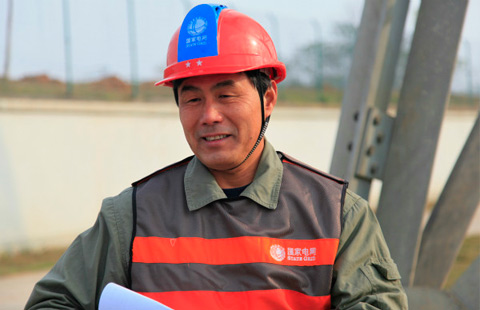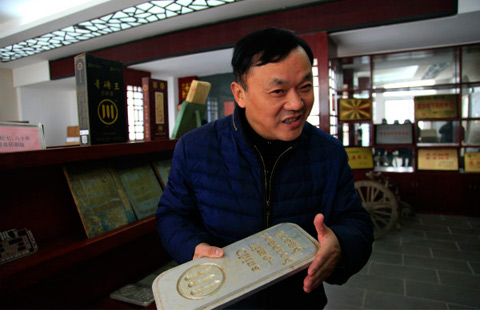Currency expands its reach
Renminbi becomes popular as more offshore centers take shape
The Chinese mainland is turning to more partners around the world to launch the next phase of yuan internationalization, with each partner selected to play a role.
After Hong Kong was given an eight-year head start as an offshore business center for the yuan, recent developments in the use of the currency in Singapore, Taiwan and London have been "very encouraging", said Peng Xingyun, a researcher and financial specialist at the Chinese Academy of Social Sciences.
These developments may indicate a rising recognition of the currency worldwide, he said.
They also reflect Chinese monetary authorities' accelerating pace of expanding offshore renminbi hubs while moving toward the currency's convertibility for the capital account and forging ahead with domestic financial reform, he said.
Nathan Chow, an economist at DBS Bank Ltd, said, "Market confidence in accepting renminbi for trade settlement will increase. In turn, this will encourage more participation from corporations and banks, potentially increasing the range of renminbi investment products."
Chow said Singapore will serve as a gateway to Southeast Asia, while Taiwan is expected to become a local hub for yuan settlement and trading.
Hong Kong's dominant role will remain, and the emergence of new offshore centers will expand the existing regime instead of creating competing systems, he said.
The People's Bank of China, the central bank, approved the Singapore branch of the Industrial and Commercial Bank of China on Feb 8 as the clearing bank in Singapore, which indicates the city state will become the third offshore yuan center after Hong Kong and Taiwan.
Ravi Menon, managing director of the Monetary Authority of Singapore, said the appointment marks a "milestone" and enables Singapore's financial center to play a useful role in facilitating greater use of the yuan.
The announcement came two days after Taiwan's banks started accepting deposits and conducting interbank trading in yuan. The People's Bank of China announced earlier that the Bank of China's Taipei branch will serve as the yuan-clearing bank on the island.
The yuan will quickly become a trade invoicing currency in Asia as the three offshore yuan centers are all in industrialized economies, the Australia and New Zealand Banking Group said in a research note. It added that South Korea has recently allowed its commercial banks to tap into the yuan swap arrangement, and Japan was able to conduct yuan trading in June.
Enthusiasm for boosting the use of the yuan has also spread outside of Asia.
The Bank of England said last month it is prepared in principle to become the first G7 central bank to enter into a foreign exchange swap agreement with China.
Under a swap agreement, central banks agree to exchange each other's currency and can then lend the money out to domestic banks in cases of emergency.
Peng said the move is a major breakthrough as swap agreements were previously confined to developing countries or economies with close bilateral trade connections.
"Now it's extended to a major world financial center of foreign exchange trade, and that means a lot," Peng said.
Britain announced the launch of an offshore yuan currency and bond market in April. The City of London's governing body said it is keen to speed up the city's push to become an offshore center for the yuan.
"(We are) working hard to increase awareness of and confidence in the use of renminbi products and services in London," said Mark Boleat, policy chairman of the City of London Corporation.
"Recent London figures showed particularly strong growth of spot renminbi forex (foreign exchange), which is evidence of the growing liquidity of the offshore yuan market (and) the increasing confidence of investors to trade in it," he said.
In the first half of 2012, the use of the yuan for trade transactions settled in London increased by 390 percent year-on-year to 2.2 billion yuan ($350 million).
By establishing a clearing bank, Singapore and Taiwan are able to independently accommodate yuan flows to and from the Chinese mainland.
This gives investors in Singapore and Taiwan access to many investment opportunities on the mainland unavailable to investors in other places, as the yuan is not freely convertible.
In comparison, offshore yuan accumulated in London can only flow into the Chinese mainland via Hong Kong's clearing bank, the Bank of China's Hong Kong branch.
But Boleat said he does not see an urgent need for London to have a clearing bank as the Hong Kong arrangements serve London's needs.
He added that maintaining a single pool of offshore yuan is important to the development of a liquid, global offshore market. "We hope that developments in other centers will not see segregated pools of renminbi being developed."
Zhu Yinan, a senior associate at the international law firm Clifford Chance, said a new yuan payment system being developed by the People's Bank of China that might be introduced in two years means London may not need its own clearing system at all, because the new arrangement may lead to 24-hour trading of the yuan with direct links between global banks and the central bank.
The Australia and New Zealand Banking Group estimated that yuan deposits may reach 100 billion yuan in Taiwan, 250 billion yuan in Singapore and 700 billion yuan in Hong Kong by the end of the year.
Yuan deposits in Hong Kong rose 5.6 percent in December to 603 billion yuan, an 18-fold jump from five years ago, while Taiwan banks held 1.3 billion yuan of deposits on Feb 6, when clearing of the currency started. As of June, the pool of yuan deposits in Singapore reached 60 billion yuan.
Contact the writers at wangxiaotian@chinadaily.com.cn and cecily.liu@chinadaily.com.cn























